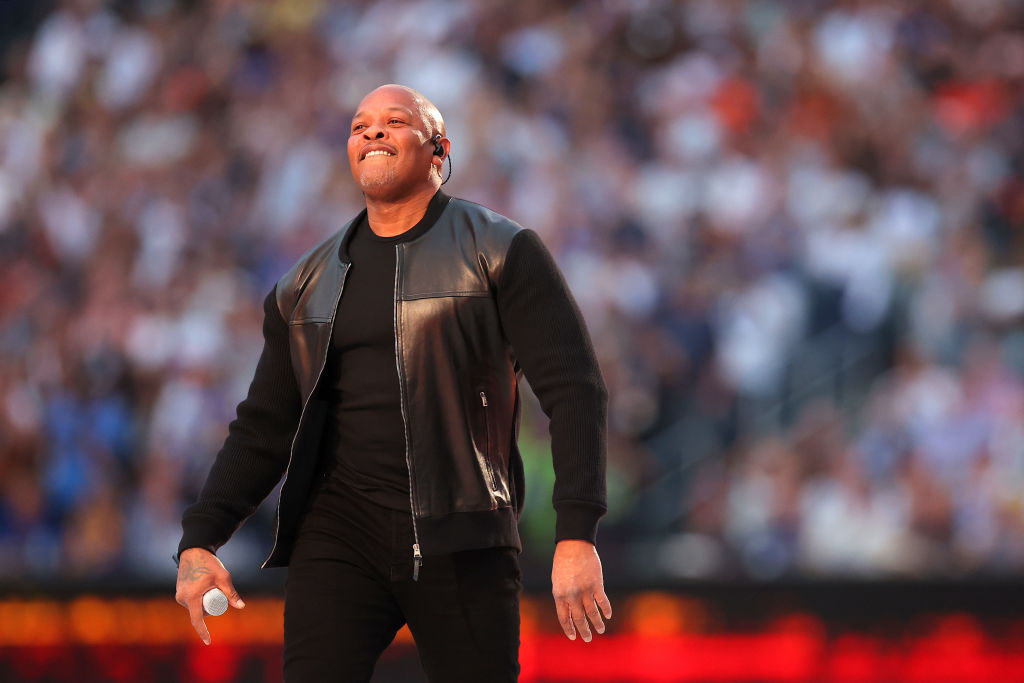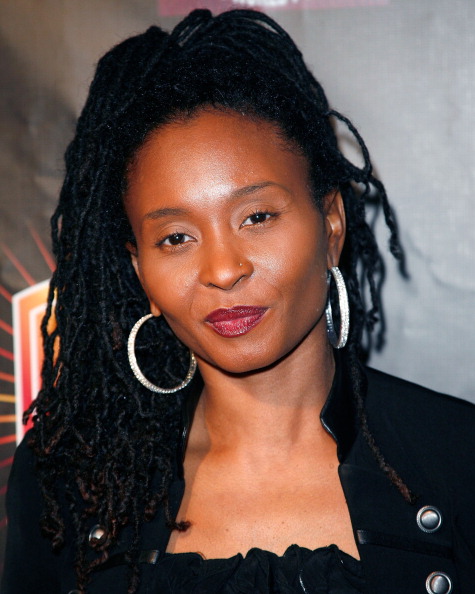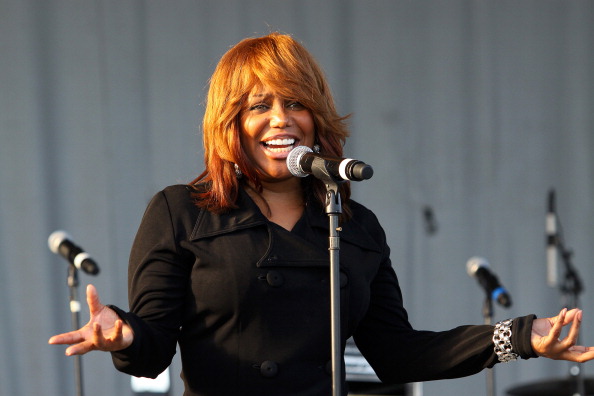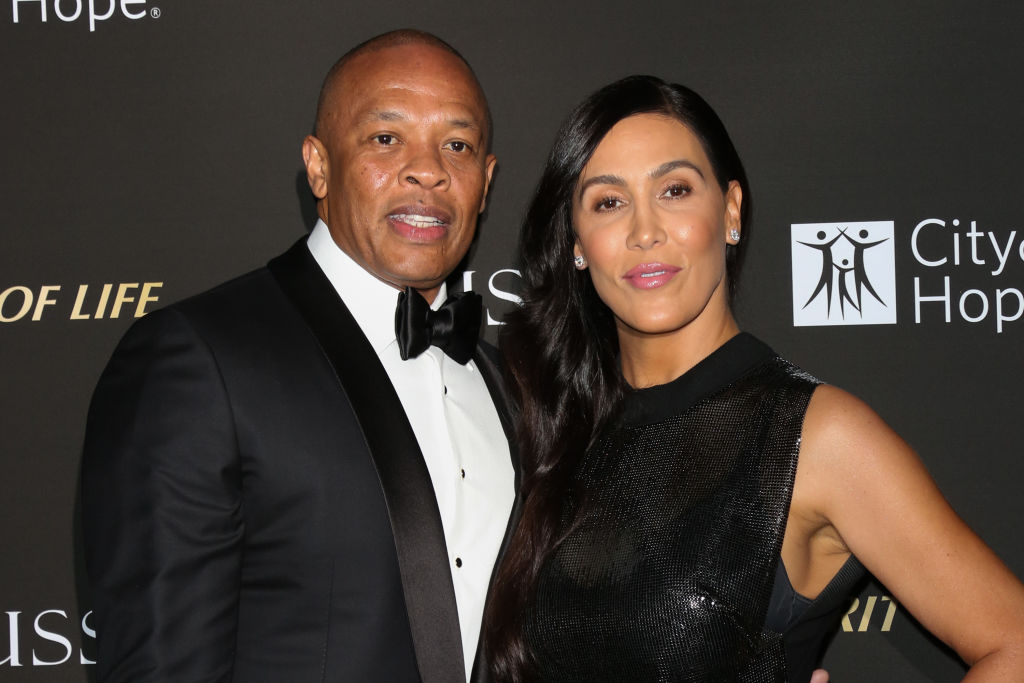Dr Dre's Abusive Past Haunts Him After Super Bowl Halftime Show Announced
Forgot About Dre? Abusive Past Comes Back To Haunt Producer After Super Bowl Halftime Show

Dr. Dre performs during the Pepsi Super Bowl LVI Halftime Show at SoFi Stadium on February 13, 2022, in Inglewood, California. | Source: Kevin C. Cox / Getty
UPDATED: 5:20 p.m. ET, Feb. 17, 2022
Originally published: Oct. 21, 2021
Dr. Dre‘s performance at halftime of Super Bown LVI was for all intents and purposes a smashing hit.
Not only did the nostalgia-inducing medley of songs produced and performed by Dr. Dre alongside the likes of Eminem, Kendrick Lamar, Mary J. Blige, Snoop Dogg and 50 Cent keep fans engaged at SoFi Stadium in Inglewood, California, but it also re-established his undisputed ability to make classic music, just in case anyone “Forgot About Dre.”
However, there was one other notable result of Dr. Dre’s Super Bowl halftime performance that can’t be ignored: It revived widespread criticism of his very real and brutal history of domestic violence and abuse against Black women, in particular.
When it was announced back in October of last year that dr. Dre would be performing at this year’s Super Bowl halftime show, we only days removed from the sex abuse conviction of R. Kelly. The timing of the disgraced singer being found guilty and Dr. Dre getting the gig of a lifetime prompted critics to speak out against what they called mixed messages to society.
There was no shortage of think pieces noting how R. Kelly’s conviction signified a win for Black women, but then the mainstream media went silent about Dr. Dre’s abusive past, not to mention the tone-deaf irony of the NFL announcing Dre’s selection days after the verdict.
There still remains the question of why mogul Jay Z — whose partnership with the NFL puts him in charge of the Super Bowl halftime show and who has frequently collaborated with Kelly and Dre well after their abusive ways were established — would choose Dre for the show knowing that the abuse of Black women was fresh on the collective consciousness of Black people following Kelly’s conviction.
It was all a bit too much to reconcile for critics on social media, the only place the debate seemed to be taking place as people sounded off on the apparent contradiction being conveyed to a society that looks down on one man for abusing Black women while looking up to another who has admittedly been guilty of similarly reprehensible behavior.
It begs the question: Is one form of abuse more tolerable or acceptable than the other?
The obvious answer, of course, should be no. But sometimes actions speak way louder than words ever can.
Without factoring the billionaire-adjacent’s contentious relationship with his daughter (who said she was homeless as recently as last summer), let’s take a look at the facts surrounding his association with other Black women as we know them, in chronological order.
Dee Barnes

Dee Barnes arrives at the Luxury Book Launch of “Hip-Hop: A Cultural Odyssey” and the exhibit premiere at The GRAMMY Museum on February 8, 2011 in Los Angeles. | Source: Paul Archuleta / Getty
Dee Barnes, a media personality and former rapper, was in 1991 the victim of a violent assault by Dr. Dre, who beat and kicked her while attempting to throw her down a set of stairs because of her association with then-rival rapper Ice Cube. According to Barnes’ own statement at the time, Dre punched her in the head multiple times and began “slamming her face and the right side of her body repeatedly against a wall.” Barnes brought a $22.75 million lawsuit against Dr. Dre, which was settled out of court with the famous producer paying just over $2,000 in fines and serving community service.
Michel’le

Singer Michel’le performs during the Woodstars Charity Concert in Maywood, Illinois on JULY 29, 2011. | Source: Raymond Boyd / Getty
Around that same time, Dr. Dre fathered a child with singer Michel’le, who told the New York Times that he once left her with “black eyes, a cracked rib and scars” from what the news outlet described as one of many violent encounters between the married couple. Michel’le’s biopic on the Lifetime network, “Surviving Compton: Dre, Suge & Michel’le,” spotlighted that abuse that Dre has acknowledged.
Michel’le also claimed that Dre once pulled a gun on her after the two got into a very heated argument, and missed shooting her by just a few inches while she was running to the bathroom. She said she believes Dre didn’t pull a gun out just to scare her and had the intent of hitting her with a bullet.
Dr. Dre apologizes
In 2015 — nearly a quarter of a century after first being publicly accused of brutally beating Barnes — Dre issued a brief statement offering a mea culpa for his abuse without explicitly acknowledging any brutality.
“Twenty-five years ago I was a young man drinking too much and in over my head with no real structure in my life,” Dre told the New York Times. “However, none of this is an excuse for what I did. I’ve been married for 19 years and every day I’m working to be a better man for my family, seeking guidance along the way. I’m doing everything I can so I never resemble that man again.”
Dre later said he was sorry.
“I apologize to the women I’ve hurt,” he said. “I deeply regret what I did and know that it has forever impacted all of our lives.”
Notably — and ominously — Barnes responded to Dre’s apology by saying, “I hope he means it.”
Nicole Young

Dr. Dre and his wife Nicole Young attend the City Of Hope Gala on October 11, 2018, in Los Angeles. | Source: Paul Archuleta / Getty
Barnes got her answer more than five years later when Nicole Young, while initiating a divorce from Dre, said in court filings that her then-husband “held a gun to her head on two occasions, once in 2000 and again in 2001,” ET reported at the time. “She also claims that he punched her in the head/face twice, as well as kicked down the door to her bedroom when she was allegedly ‘hiding from his rage in 2016.'”
Young called Dre’s denials of the abuse “lies” and described in court documents how Dre “verbally and emotionally decimated my personhood to the extent that I currently suffer from post-traumatic stress syndrome.”
Young specifically addressed the abuse she said she suffered at Dre’s hands.
Asking the court to consider Dre’s “long-term abuse,” Young referenced what she called Dre’s “relentless campaign of abuse and control over me for more than half of my life.”
Young added later: “It is misleading, revolting and insulting for Andre to suggest that I have not been abused because, as a victim of relentless abuse and isolation, I did not create and maintain a contemporaneous record of abuse inflicted on me.”
What’s next
Dr. Dre will celebrate his 57th birthday on Friday and will more than likely continue being a revered icon in hip-hop as well as popular music
Honestly? Nothing, probably.
Except, that is, Dre will more than likely remain an untouchable musical icon as society continues to try to relegate Black women to the background until the media feels it is advantageous to cover them, like after the R. Kelly verdict.
In that order.
SEE ALSO:
Dr. Dre’s Estranged Daughter Says She’s Homeless Despite Dad’s $800 Million Fortune
[ione_media_gallery id=”4208746″ overlay=”true”]








